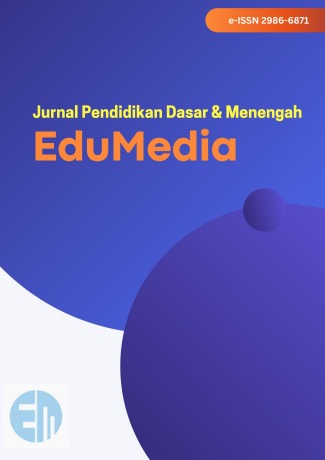Integrating Cultural Aspects in EFL Curriculum: Fostering Intercultural Awareness and Communicative Competence
DOI:
https://doi.org/10.69743/edumedia.v3i2.45Kata Kunci:
communicative competence, cultural teaching, efl curriculum, intercultural awarenessAbstrak
This study employs a library research approach to examine the integration of cultural aspects into the English as a Foreign Language (EFL) curriculum as a means of enhancing students’ intercultural awareness and communicative competence. Academic literature on culture-based learning, teacher perceptions, and the use of authentic materials was systematically reviewed and synthesized. Findings reveal that embedding cultural dimensions into EFL instruction fosters empathy, motivation, and communication skills, yet faces persistent challenges such as limited resources, narrow textbook content, and insufficient teacher training. The study underscores the need for a culturally responsive curriculum supported by teacher capacity-building, practical strategies, and institutional support. In the context of globalization, cultural integration is not an optional supplement but a core pedagogical approach for cultivating learners who are linguistically proficient, culturally sensitive, and globally competent. Authentic materials—such as cultural stories, films, and real-life scenarios—emerge as effective tools for meaningful cultural engagement when applied through structured and reflective methods. The paper offers practical recommendations for curriculum developers, teacher educators, and policymakers to systematically embed culture into EFL education.
Unduhan
Referensi
Abdollahi-Guilani, M., Mohd Yasin, M. S., Hua, T. K., & Aghaei, K. (2012). Culture-Integrated Teaching for the Enhancement of EFL Learner Tolerance. Asian Social Science, 8(6), p115. https://doi.org/10.5539/ass.v8n6p115
Alhumsi, M. H. (2024). Challenges of learning speaking skills in online learning environments: A study of Jordanian EFL teachers’ perceptions. Journal of Education and E-Learning Research, 11(4), 737–746. https://doi.org/10.20448/jeelr.v11i4.6216
Baker, M. (2017). In other words: A coursebook on translation (Third edition). Routledge.
Bernal Pinzón, A. N. (2020). Authentic Materials and Tasks as Mediators to Develop EFL Students’ Intercultural Competence. HOW, 27(1), 29–46. https://doi.org/10.19183/how.27.1.515
Byram, M., & Feng, A. (2004). Culture and language learning: Teaching, research and scholarship. Language Teaching, 37(3), 149–168. https://doi.org/10.1017/S0261444804002289
Cao, M.-Y., Li, D., & Wang, J. (2020). A Study of College English Culture Intelligence- Aided Teaching System and Teaching Pattern. English Language Teaching, 13, 77-83. https://doi.org/10.5539/elt.v13n3p77
Çelik, S. (2021). Culture and language instruction: Does Turkey’s EFL curriculum do enough to support intercultural awareness? International Journal of Curriculum and Instruction 13(3) (2021) 3443–3463.
Doeur, B. (2022). Implementation of Communicative Language Teaching: Cambodian EFL Teachers’ Attitudes toward Communicative Language Teaching. International Journal of Instruction, 15(2), 155–170. https://doi.org/10.29333/iji.2022.1529a
Fauzi, I., Mardiana, D., Asi, N., Andiny, F. N., Fitrianda, S., & Vebrian, E. M. (2025). Videos and E-Books Featuring Central Kalimantan Folklore as Resources for Interactive Narrative Text Learning. KnE Social Sciences. https://doi.org/10.18502/kss.v10i12.18880
Griffith, W. I., & Lim, H.-Y. (2024). Teaching Intercultural Communicative Competence in the Foreign Language Classroom. Mextesol Journal, 48(1), 1–10. https://doi.org/10.61871/mj.v48n1-13
Iswandari, Y. A., & Ardi, P. (2022). Intercultural Communicative Competence in EFL Setting: A Systematic Review. rEFLections, 29(2), 361–380. https://doi.org/10.61508/refl.v29i2.260249
Luo, H., Siripala, W., Somrang, K., & Chiamthong, P. (2024). The Influence of a Chinese Traditional Culture Course on Primary Students’ Language Learning. International Journal of Education and Literacy Studies, 12(4), 3–13. https://doi.org/10.7575/aiac.ijels.v.12n.4p.3
Mardiana, D., & Fauzi, I. (2024). Makna Kultutal Benda-Benda Bersejarah Peninggalan Kesultanan Kutaringin Sebagai Wacana Artefak dalam Pembelajaran Bahasa dan Sastra. Yayasan Drestanta Pelita Indonesia. https://publisher.yayasandpi.or.id/index.php/dpipress/article/view/1584
Méndez Rojas, D. B. (2024). Benefits of including culture in English language teaching and learning. Revista Lengua y Cultura, 6(11), 44–51. https://doi.org/10.29057/lc.v6i11.13383
Özışık, B. Z., Yeşilyurt, S., & Demi̇Röz, Dr. H. (2019). Developing intercultural awareness in language teaching: Insights from EFL lecturers in Turkey. Dil ve Dilbilimi Çalışmaları Dergisi, 15(4), 1436–1458. https://doi.org/10.17263/jlls.668546
Phongsirikul, M., & Thongrin, S. (2019). Developing Intercultural Awareness in ELT: Students’ Attitudes toward their Intercultural Learning Experience. rEFLections, 26(1), 78–114. https://doi.org/10.61508/refl.v26i1.203947
Purba, H. (2011). The Importance of Including Culture in EFL Teaching. JET (Journal of English Teaching), 1(1), 44. https://doi.org/10.33541/jet.v1i1.51
Şerif Baltaci, H. (2018). The Place of Culture in EFL Classes: Perceptions and Challenges of Pre-Service and In-Service English Teachers. International Journal of Languages’ Education, 1(Volume 6 Issue 2), 260–272. https://doi.org/10.18298/ijlet.2975
Tural, P., & Cubukcu, F. (2021). Raising intercultural awareness through short stories in EFL classes. Journal of Educational Sciences, 43(1), 18–32. https://doi.org/10.35923/JES.2021.1.02
Vowell, K. (2024). Collaboration, Connection, & Culture: Understanding the Impact of Institutional Culture on Online Teaching in Higher Education. Online Learning, 28(3). https://doi.org/10.24059/olj.v28i3.4561
Zhang, Y., & Chen, X. (2023). Exploring Cultural Identity and Language Development Through Digital Storytelling: Tales of Culturally-Linguistically Diverse Secondary Students. International Journal of Technology in Teaching and Learning, 19(2). https://doi.org/10.37120/ijttl.2023.19.2.03
Wu, Y., & Gao, H. (2025). From challenges to transformation: The professional development journey of transnational language teachers in the United States. Journal of Teaching and Learning, 19(2), 135–153. https://doi.org/10.22329/jtl.v19i2.8977
Unduhan
Diterbitkan
Cara Mengutip
Terbitan
Bagian
Lisensi
Hak Cipta (c) 2025 Florence Angelaila Fauzi, Faishal Hamdan Syakirin Hamid, Derry Pramudya Suisno, Zaitun Qamariah

Artikel ini berlisensi Creative Commons Attribution 4.0 International License.













